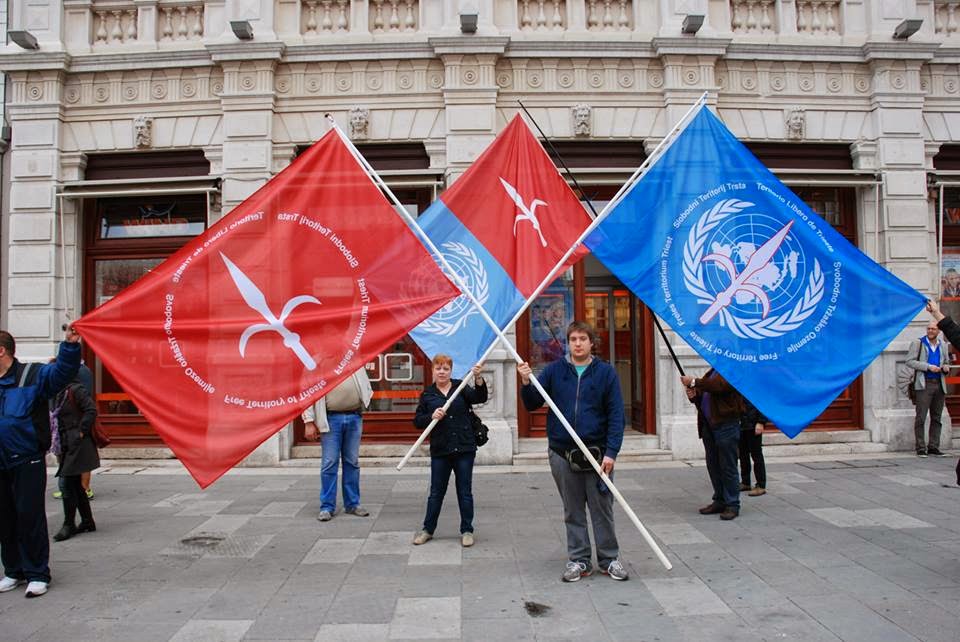STRASBOURG RECEIVES FREE TRIESTE’S APPEAL VS THE ITALIAN ADMINISTRATIVE JUDGMENTS AGAINST THE FREE TERRITORY OF TRIESTE
The European Court of Human Rights (ECHR) received Free Trieste’s appeal agains two Italian administrative judgments. It is the decisions regarding elections in Region Friuli Venezia Giulia.
The judgments are No. 530/2013 of the TAR FVG (Regional Administrative Court for the Region) and No. 1350/14 of the Italian Consiglio di Stato (Council of State).
On October 28th, 2013, the TAR FVG rejected an appeal by 57 citizens of Trieste. They had impugned the Regional elections arguing that they were taking place in a foreign Country: the Free Territory of Trieste.
The appeal questioned the very Law establishing Autonomous Region Friuli Venezia Giulia. According to Free Trieste, Constitutional Law No. 1 of 31 January 1963 may as well be null and void:
…for absolute lack of title and absolute incompatibility with Constitutional law of the part aggregating to Autonomous Region Friuli Venezia Giulia “within the unity of the Republic of Italy, one and indivisible” even the Communes of Trieste, Duino-Aurisina, Monrupino, Muggia, San Dorligo della Valle e Sgonico, which are not part of the national territory of Italy, and are already subject to a specific, different regulation of international Law…
[NOTE: this argument later proved incorrect. Indeed, Italian Constitutional Law 1/63 was extended to the Free Territory by the Commissioner of the Italian Government in Bulletin No. 7 of 1963. In doing so, he exercise a legitimate power deriving from the administering Italian Government].
The Region’s establishment (envisioned by the Italian Constitution within the Republic’s 1 January 1948 national borders, which do not include Trieste) doesn’t affect the legal status of the six municipalities.
They are and remain bodies of the Free Territory of Trieste, subject to the Italian Government’s temporary civil administration (1954 MoU) in compliance with the 1947 Treaty of Peace.
Indeed, the Free Territory exists by virtue of an international Treaty: no domestic law of one of the Signatories can ament it. Especially a defeated State’s internal law. Italy is bound by its own legal order to respect the Peace Treaty.
Trieste, as a new independent State under the UNSC’s own protection, has its own territory, people, Government, and even electoral laws.
Adminsitrative judgment No. 530/2013 rejected the appeal with political opinions that are also against the law. In particular, the Court claims that the Free Territory of Trieste has no legal existence, and accuses the main appellant (myself, Roberto Giurastante) of being “subversive” on the bases of his legal opinions. According to the Court, denying Italian sovereignty over Trieste is a crime against the Italian State, punishable with up to 12 years in prison.
The administrative Court’s accusation clearly aims at repressing free speech, the right to express one’s political views, and to act before Court. This doesn’t only damage the appellants, but all the people of the Free Territory.
This is why Free Trieste impugned the adminsitrative judgment of first before the Council of State. Yet, on 18 March 2014, the adminsitrative Court of second instance confirmed the first decision with judgment No.1350/14.
All while the local prosecution used the adminsitrative decision of first instance to incriminated 56 citizens of Trieste in two different proceedings for standing in defense of the Free Territory’s rights.
Following this discriminatori action against Trieste’s people who claim their legitimate rights, Free Trieste is accusing Italy of breaching arts. 6, 7, 9, 10, 13, 14 of the European Declaration of Human Rights (fair trial, right to express opinion, anti-discrimination provisions).
Furthermore, it is breaches of individual rights committed by the local Italian authorities in order to simulate Italian sovereignty over Trieste. This constitutes a simultaneous breach of international law, of the administered Free Territory’s legal order, and even of the Italian legal order.
Translated from blog “Environment and Legality” by Roberto Giurastante


RT @TriesteLibera: 2014: #FTT AT THE EUROPEAN COURT OF #HUMANRIGHTS via @RobertoGiurasta https://t.co/7yvZ3fUcjg
RT @TriesteLibera: 2014: #FTT AT THE EUROPEAN COURT OF #HUMANRIGHTS via @RobertoGiurasta https://t.co/7yvZ3fUcjg
RT @TriesteLibera: 2014: #FTT AT THE EUROPEAN COURT OF #HUMANRIGHTS via @RobertoGiurasta https://t.co/7yvZ3fUcjg
2014: #FTT AT THE EUROPEAN COURT OF #HUMANRIGHTS via @RobertoGiurasta https://t.co/7yvZ3fUcjg
#FTT AT THE EUROPEAN COURT OF #HUMANRIGHTS #ECHR of #Strasbourg #trieste #freeterritory http://t.co/QnltZAac5H
@RobertoGiurasta In English: http://t.co/QnltZAac5H